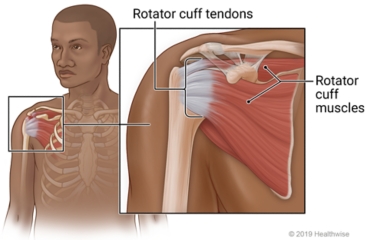
What is rotator cuff repair surgery?
Rotator cuff repair surgery is done to fix a tear in the rotator cuff. Your doctor may also clean the space between the rotator cuff tendons and the shoulder blade. This is called subacromial smoothing.
Your doctor will do either arthroscopic or open surgery.
With arthroscopic surgery, your doctor uses a lighted tube with a tiny camera. This tube is called an arthroscope. Your doctor puts it and other surgical tools through small cuts (incisions) in your shoulder. You will likely go home the same day you have this surgery.
With open surgery, your doctor will make a 2- to 4-inch incision in your shoulder. You will likely go home the same day you have this surgery.
In both surgeries, the scars usually fade with time. You will wear a sling for several weeks.
You will need physical rehabilitation (rehab). At first, you will get help with the exercises. Later, your doctor or physical therapist will give you exercises to do on your own. Rehab will last several months. It will take a few months before you will be able to use your arm normally. It will take longer before you will be able to throw objects or play sports.
After surgery and rehab, you will probably have less pain and more strength in your shoulder. You should be able to lift and rotate your arm better. Some people have to avoid lifting heavy objects.
If you have a desk job, you may be able to return to work or your normal routine within a couple of weeks. If you push, pull, or lift at work, you may be away from work for a few months. If you work at a job that involves heavy manual labor, lifting your arms above your head, or using heavy tools, you may have to think about finding other work.
How do you prepare for surgery?
Surgery can be stressful. This information will help you understand what you can expect. And it will help you safely prepare for surgery.
 Preparing for surgery
Preparing for surgery
- You may need to shower or bathe with a special soap the night before and the morning of your surgery. The soap contains chlorhexidine. It reduces the amount of bacteria on your skin that could cause an infection after surgery.
- Be sure you have someone to take you home. Anesthesia and pain medicine will make it unsafe for you to drive or get home on your own.
- Understand exactly what surgery is planned, along with the risks, benefits, and other options.
- If you take a medicine that prevents blood clots, your doctor may tell you to stop taking it before your surgery. Or your doctor may tell you to keep taking it. (These medicines include aspirin and other blood thinners.) Make sure that you understand exactly what your doctor wants you to do.
- Tell your doctor ALL the medicines, vitamins, supplements, and herbal remedies you take. Some may increase the risk of problems during your surgery. Your doctor will tell you if you should stop taking any of them before the surgery and how soon to do it.
- Make sure your doctor and the hospital have a copy of your advance directive. If you don't have one, you may want to prepare one. It lets others know your health care wishes. It's a good thing to have before any type of surgery or procedure.
What happens on the day of surgery?
-
Follow the instructions exactly about when to stop eating and drinking. If you don't, your surgery may be canceled. If your doctor told you to take your medicines on the day of surgery, take them with only a sip of water.
-
Take a bath or shower before you come in for your surgery. Do not apply lotions, perfumes, deodorants, or nail polish.
-
Do not shave the surgical site yourself.
-
Take off all jewelry and piercings. And take out contact lenses, if you wear them.
At the hospital or surgery center
-
Bring a picture ID.
-
The area for surgery is often marked to make sure there are no errors.
-
You will be kept comfortable and safe by your anesthesia provider. The anesthesia may make you sleep. Or it may just numb the area being worked on.
-
The surgery will take about 2 hours.
When should you call your doctor?
- You have questions or concerns.
- You don't understand how to prepare for your surgery.
- You become ill before the surgery (such as fever, flu, or a cold).
- You need to reschedule or have changed your mind about having the surgery.
Where can you learn more?
Go to http://www.healthwise.net/patientEd
Enter Z068 in the search box to learn more about "Rotator Cuff Repair: Before Your Surgery".
Current as of: July 31, 2024
Author: Ignite Healthwise, LLC Staff
Clinical Review Board
All Healthwise education is reviewed by a team that includes physicians, nurses, advanced practitioners, registered dieticians, and other healthcare professionals.

